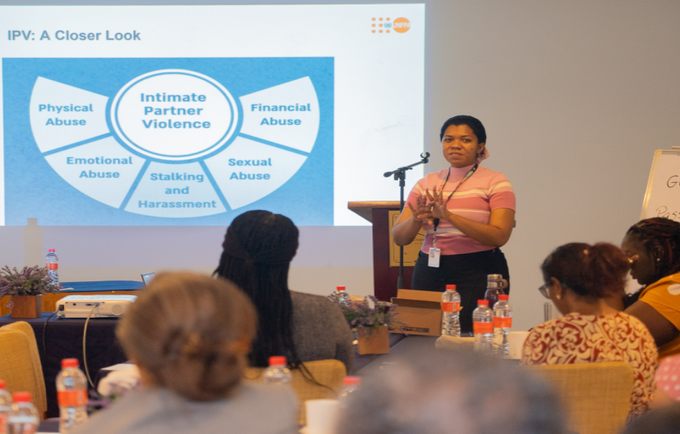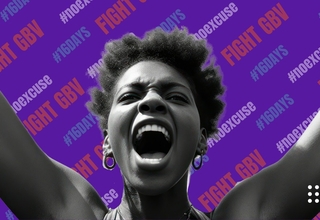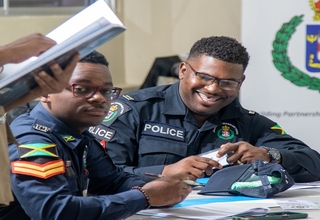Caribbean frontline workers were recently supported by the United nations Population Fund (UNFPA) in their efforts to take action against gender based violence with the hosting of training sessions focused on the Clinical Management of Rape (CMR)/Intimate Partner Violence (IPV). Health care providers From Grenada, Guyana, St. Lucia, St. Vincent and the Grenadines and Dominica convened in Guyana for the training which sought to build the capacity of national authorities and health providers in CMR-IPV to ensure survivor-centered, comprehensive and life-saving services to survivors of gender-based violence. The activity was conducted under the EQUAL SRHR project which is funded by the government of Canada.
Prior to the training, assessments were done (using the WHO Quality Assurance Tool- Minimum Care Version) in four different levels of health facilities in Guyana to determine their readiness and response to GBV/IPV (particularly the CMR), and to provide a basis to inform specific areas of the training content. The actual training consisted of 5 days of training in areas that focused on the basics of GBV; First line Response - LIVES; Steps of Clinical Maanagement of Rape; and application of content to the national context.
This was followed by 3 days of Training of Trainers (ToT) training. Facilitation was done by Suhaila Aboud (CMR Specialist, UNFPA Global Roving Team) and assisted by Eugenia Sekler (SRH Programme office, Venezuelan Country Office).
The training was attended by 24 Clinicians and 1 GBV specialist from Guyana, Grenada, St. Lucia andSt. Vincent and the Grenadines, who support GBV/IPV survivors in the front line.
Dr. Narine Singh, the Chief Medical Officer representing the Ministry of Health, in his opening remark stated that “Sexual reproductive health is a basic human right”. He continued to highlight the gravity of the GBV issue in Guyana,- stating that 55% of women experience some form of violence in their life time and emphasized the urgency of the capacity development of frontline health providers to respond to the needs of GBV survivors;
“Rape and Intimate Partner Violence (IPV) are not just medical issues, it is social and psychological issue which persist in the survivor’s life. We need to provide a comprehensive and holistic approach, including follow-up, and ensure universal access to services to vulnerable populations, including migrants and indigenous people.” Dr Singh added.
Through eight (8) days of intensive training, participants learnt and discussed fundamental concepts and principles to understand GBV and provide care to the survivors, practical clinical knowledge and techniques to ensure respectful and survivor-centered care, as well as systematic and holistic support and action plans.
One of the most impactful learnings among participants is the first-line response by healthcare providers. A clinician from Guyana said, “The introduction of the LIVES (Listen, Inquire, Validate, Ensure Safety and Support) is the most impressive thing in this training. Since we can implement it anytime, anywhere, it helps survivors' lives, their families and community.”
Suhaila Aboud, the lead facilitator, repeatedly emphasized that: “There is evidence that if the survivor receives the first-line response, which includes it significantly helps them to recover from the incidents compared to any first-line response or just medical treatment provided”.
The latter part of the training focused on the trainer’s skills to disseminate their learnings. Participants learnt the theory and methodology of adult learning and ended with demonstrations of short learning sessions. A Clinician from Grenada said, “I learnt that we need to be conscious of the rationale behind the applied teaching methods. Teaching can be more effective and encourage active participation when information is conveyed in various ways according to the learning objectives and styles”.
The fruitful training days gave participants the necessary competencies to deal with GBV/IPV survivors and the confidence and encouragement to bring tangible changes to their health facilities.
“I feel enthusiastic about the changes I can make in the hospital where I am currently practicing, I can see improvements both in the survivor’s care and capacity of health care providers in performing their duties” Pricilla – Clinician from ?
Several challenges are acknowledged during the training, such as the law and regulations, standardized protocol, multi-sectoral referral network and data management. However, ensuring access to the best health care for survivors is a primal step to establishing a holistic support system for survivors. Certified CMR/IPV trainers are now well-motivated to share their learning and make positive changes to ensure access to quality survivor-centered care.




